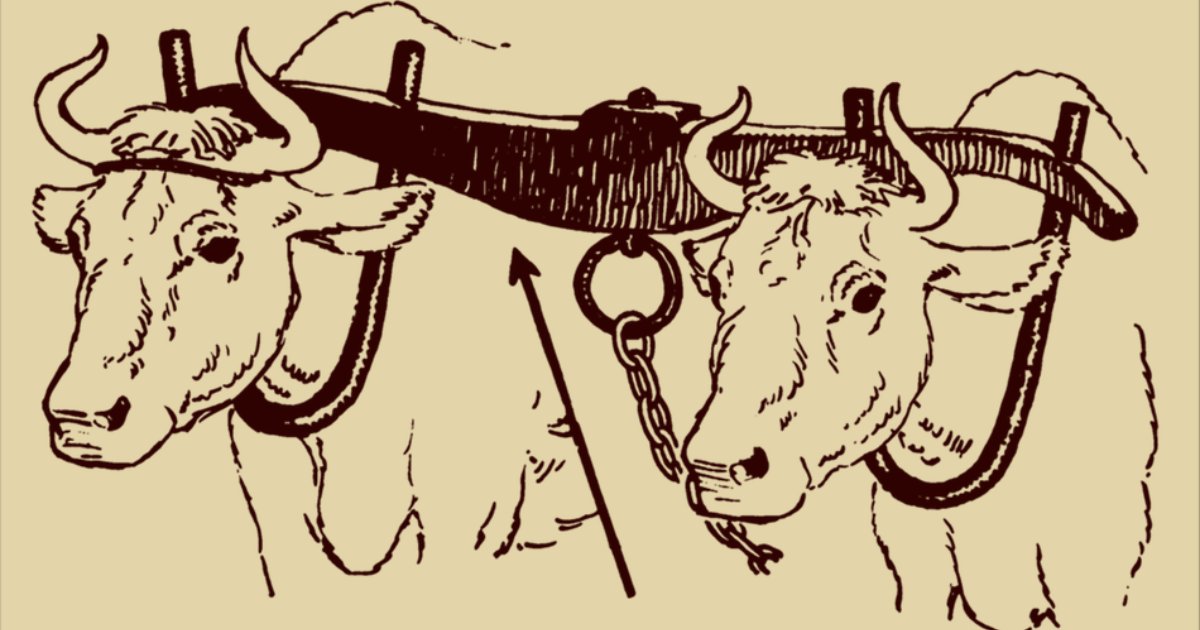A yoke is a wooden beam that is sometimes used between a pair of oxen or other animals to help them work together when pulling a load. It is defined as "a device for joining together a pair of draft animals, especially oxen, usually consisting of a crosspiece with two bow-shaped pieces, each enclosing the head of an animal."
What was the yoke that Jesus referenced in the Bible? In biblical times, it was a familiar term to most people and worked well for a parable of Jesus. Let's explore the biblical definition of Yoke and why Jesus used it in his teachings.
"Come to me, all who labor and are heavy laden, and I will give you rest. Take my yoke upon you, and learn from me, for I am gentle and lowly in heart, and you will find rest for your souls. For my yoke is easy, and my burden is light.” (Matthew 11:28-30)
Yoke Definition
According to Smith’s Bible Dictionary, Yoke means "A well-known implement of husbandry, frequently used metaphorically for subjection, e.g. (1 Kings 12:4, 1 Kings 9-11) hence an "iron yoke" represents unusually galling bondage. (Jeremiah 28:48; Jeremiah 28:13)."
In Easton’s Bible Dictionary, a yoke is defined to be: Fitted on the neck of oxen for the purpose of binding to them the traces by which they might draw the plow, etc. (Numbers 19:2; Deuteronomy 21:3). It was a curved piece of wood called an 'ol.
Essentially, a yoke was a harness used by oxen and other animals to ease the work of hauling a load. It was also meant as a designation of servitude and carrying the burden of a task or mission. Here is an example of two oxen with a yoke pictured below:

Bible Meaning of Yoke
The word "yoke" is used in the Bible in various ways, but it most often refers to a wooden frame placed over the necks of two animals so that they can pull together a plow or cart. In this sense, a yoke represents teamwork and cooperation.
However, the word "yoke" can also be used to symbolize oppression and slavery. For example, in the book of Deuteronomy, God warns the Israelites that if they disobey Him, He will put a "yoke of iron" on their necks (Deuteronomy 28:48). This means that their enemies will enslave them.
In the New Testament, Jesus uses the image of a yoke to describe the relationship between Himself and His followers. He says, "Take my yoke upon you and learn from me, for I am gentle and humble in heart, and you will find rest for your souls" (Matthew 11:29). This yoke represents the commitment of discipleship, but it is also a yoke of love and service. Jesus promises His followers that if they trust in His dominion, they will find true peace and joy.
Here are some examples of how the word "yoke" is used in the Bible:
"And they put the yoke of oxen on me, and I plowed for seven years" (Genesis 41:46).
"Come, let us bear the yoke of the LORD, for it is good" (Lamentations 3:27).
"My yoke is easy and my burden is light" (Matthew 11:30).
"Bear one another's burdens, and so fulfill the law of Christ" (Galatians 6:2).
Overall, the word "yoke" in the Bible has a variety of meanings, but it most often represents teamwork, cooperation, and discipleship. It is a reminder that we are all called to work together to serve God and others.
The Yoke of Jesus
When Jesus said, “Take my yoke upon you” (Matthew 11:29), He meant that we are to submit ourselves to Him every day in every way. A yoke was made of wood, hand-carved to fit the neck and shoulders of the animal to prevent pain or discomfort. In ancient culture, the word yoke was a term that was used to describe submission. So when someone was described as being yoked to someone or something, it communicated the idea that he or she was submitting to that person or thing.
So, to be yoked to Jesus is to serve and follow Him. Before you bristle at that idea, consider this: everyone is yoked to someone or something. The question is, to whom or what do you want to be yoked? Some are yoked to the power of sin. They are under its control. Some are yoked in a relationship with unbelievers, and the Bible warns very specifically against that.
"Do not be unequally yoked with unbelievers. For what partnership has righteousness with lawlessness? Or what fellowship has light with darkness?" (2 Corinthians 6:14)
"For freedom Christ has set us free; stand firm therefore, and do not submit again to a yoke of slavery." (Galatians 5:1)
"Let all who are under a yoke as slaves regard their own masters as worthy of all honor, so that the name of God and the teaching may not be reviled. Those who have believing masters must not be disrespectful on the ground that they are brothers; rather they must serve all the better since those who benefit by their good service are believers and beloved. Teach and urge these things." (1 Timothy 6:1-2)
Yoke and Discipleship
“Is not this the kind of fasting I have chosen: to loosen the chains of injustice and untie the cords of the yoke, to set the oppressed free and break every yoke?” (Isaiah 58:6) Jesus, if we’re willing, releases the yoke of our oppression and encourages us to take on His yoke instead.
He said, “Take my yoke upon you and learn from me. My yoke is easy and my burden is light.” But why wouldn't we avoid yokes altogether and do our own thing? Ironically, there is a comfort in being "yoked" to something or someone when it is a benevolent entity. We must learn how to live from somewhere, and being completely alone can be intimidating and overwhelming. Jesus is offering us an opportunity to learn from him and serve a righteous purpose by making our lives easier and more meaningful.
Let’s consider the context of Jesus’ words. Two oxen are chosen to share a yoke. The first is an older, seasoned ox. He is trained and hardy from years of routine. The second is a new young ox. He has potential but is inexperienced. The elder trains the young by sharing the same yoke with a veteran workhorse.
Not only that, but the experienced one draws harder to bear the majority of the load. Since the older one leads, the younger ox does not have to wonder what to do. He learns from his mentor and gains the knowledge and skill to teach others.
This very much resembles discipleship. Jesus invites us to ‘learn of Him,’ which is another way of stating, ‘be my disciple.’ There’s peace in not having to figure life out on our own. There’s assurance as we follow His lead.
Jesus also declares that His yoke is easy. The word ‘easy’ here doesn’t imply ‘simple’, but ‘good’. If I’m yoked to Jesus, there’s peace in being yoked to someone good, loving, and patient.
The paraphrase? “Get in the yoke with me. Let me disciple You. I’ll bear the weight of your burden. My yoke is good and you will find rest and companionship in our labor together.”
Sources
Put on His Yoke? - Greg Laurie
What Kind of Yoke Does Jesus Offer? - Christine Wyrtzen
Photo: Getty/MaYcaL

.jpg)

.jpg)
